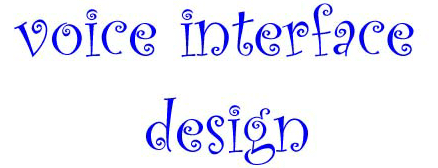|
|
|
|
 |
|
|
 |
|
|
 |
|
 |
|
|
|
|
voice interfaces are an emergent -- and, i expect, shortly-to-be-dominant -- technology for interacting with databases. such things, in very primitive and highly annoying fashion, exist now. they are the automated telephone menus that you have to navigate endlessly when you phone almost any company these days, and the supercilious bell telephone systems that start out, "for service in english, say 'english'. pour service en francais, dit 'francais'". currently the available databases are limited to phone books and financial records and the like; soon, they will be vast networks of information (e.g., big honking websites). the technology is at hand to get rid of the menus, along with most of the annoyances, and just talk to automated agents. in natural, conversational, english, not only about the name of the vp of corporate relations or what your bank balance is, but about the hockey scores, the latest movies, the best price for digital cameras. and they'll tell you.
|
|
that's sort of like saying, in 1981, that the technology is at hand to just point at objects on a screen with a hand-controlled arrow, click a button, and the rest is magic. well, the magic required heavy design efforts, as a decade of market-failure demonstrated, and 20 years later we still have to battle with crappy graphic interfaces (as well using happily the noncrappy ones). interface design is not easy. working with voice input-and-output alone will not make it any easier. the interactions will have to be scripted, strategies will have to be developed, lessons will have to be learned.
|
|
this course is a seminar in designing, scripting, strategizing, developing, and learning this new style of interface, drawing largely on what is known about natural human/human verbal interaction, and on the computer-mediated tasks the interfaces will front
|
|
|
 |
|
|
|
<15 students, by permission of the professor; a demonstrated interest in interface design, graphic and/or voice, as well as a sensitivity to spoken language, will be a decided asset; also, it is good to be cheerful, thrifty, and brave.
|
|
|
 |
|
|
|
| tuesday nights, 6-9, HH 138 |
|
|
 |
|
|
|
| required text |
hutchby and wooffitt, conversation analysis: principles, practices and applications
|
| other required readings |
circulated, emailed links or documents, and reserve readings
|
| recommended text |
hutchby, conversation and technology
|
|
|
 |
|
|
|
| course participation 50% |
|
25% for small papers
25% for class discussion
|
take-home voice-interface
design project final 50% |
|
10%for presentation and proposal
40%for final project
|
|
small papers
|
|
these papers are worth 25% in total, but they will not be graded. if you complete them all, you get 25% of your final grade (effectively an a++ for this part of the course). if you miss one, you will get 20%. if you miss two or more, you will get 0% (yep, zero).
the opinionated summaries are just synopses of the week's readings, inter-larded with some evaluation of their cogency, relevance, and so on; i want to see (1) that you have read them, (2) that you have thought about them, and i want to (3) grease the vocal wheels a bit for the class discussions.
the opinionated speculation is your chance to (briefly) go off half cocked about anything you like that relates to the three themes of machines, conversation, and interface design; i would like to see the conversational analysis readings brought to bear on your speculations, but won't hold you to that.
again, these assignments will not be graded, simply collected and tallied, though i will always read them with interest, and may occasionally write responses to them.
|
|
projects
|
|
the 3 and 10 july classes will be given over to presentations and responses about project proposals. you will need to have a firm idea in mind about what you will design your interface for, and roughly what sorts of challenges and opportunities that you anticipate. you will present it to the class. you will also need to write up that proposal, submitting one copy to me, one to a respondent (i will work up an exchange list for the 26 june class, so you'll know who to exchange with). the respondent will comment on the proposal, offering criticisms and suggestions.
as time and opportunity permit, we will all discuss, criticize, and creatively aid the proposals.
the proposal and presentation of your project will constitute 10% of your project grade; it will be evaluated.
i encourage collaborative projects.
|
|
|
 |
|
|
|
|
|
|
|
|
|
|
|
for an opaled view of the course (and reading downloads, and useful links), please go to opal gamble's 481v parallel universe
|
|
|
|
|
|
|
|
|
|



